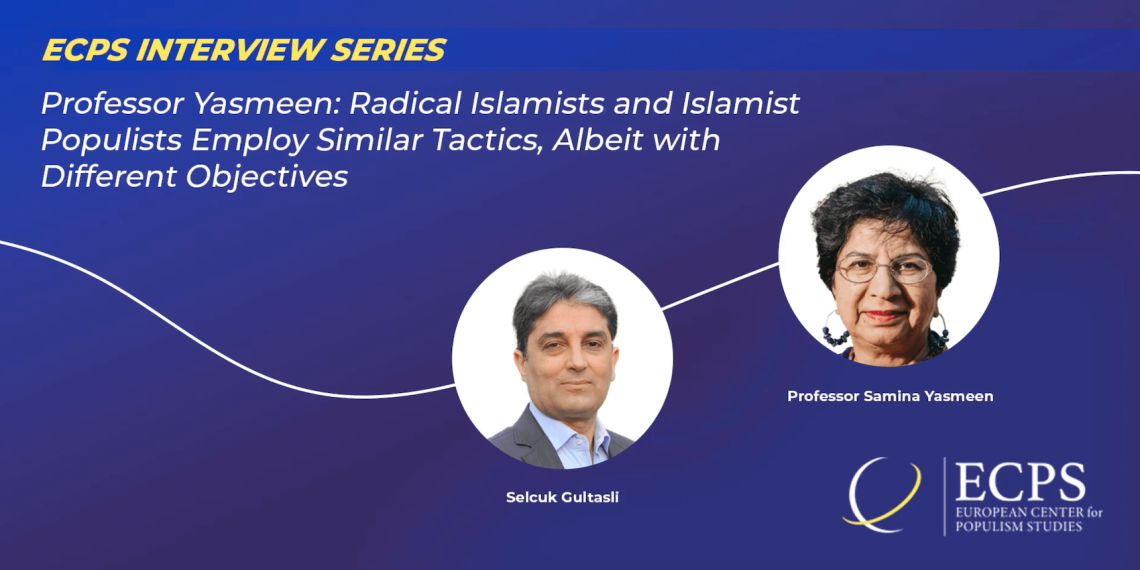Drawing a comparison between radical Islamism and Islamist populism, Professor Samina Yasmeen emphasized the parallel communication styles utilized by both radical and populist Islamists, highlighting their reliance on simplicity and Islamic references to connect with the populace. However, she pointed out that while radical Islamists aim for a fundamental alteration of the state, populist Islamists, exemplified by figures such as Imran Khan, prioritize the establishment of a “well-governed state.”
Interview by Selcuk Gultasli
In an exclusive interview with the European Center for Populism Studies (ECPS), Professor Samina Yasmeen, the Director of the Centre for Muslim States and Societies at the University of Western Australia, delves into the complex landscape of Pakistani politics, exploring the roots of populism and its intersection with Islamism.
While a coalition consisting of the Pakistan Muslim League-Nawaz (PML-N) and the Pakistan People’s Party (PPP) has agreed to form the next government of Pakistan, thereby preventing the party of former Prime Minister Imran Khan from assuming power despite garnering the most votes in the election, Professor Yasmeen has pointed out that populist Islamism shares certain techniques with radical Islamism in many respects. When asked to differentiate between radical Islamism and Islamist populism, Professor Yasmeen highlighted the parallel communication styles employed by radical and populist Islamists, underscoring their use of simplicity and Islamic references to resonate with the populace. According to her, while radical Islamists seek a fundamental alteration of the state, populist Islamists, exemplified by figures such as Imran Khan, prioritize the establishment of a well-governed state.
Professor Yasmeen begins by shedding light on the historical antecedence and foundational underpinnings of populism in Pakistan, emphasizing the significant influence of the public’s inclination towards charismatic personalities. She attributes the prevalence of populism to the prevailing low level of literacy, creating a susceptibility to external influences and reinforcing the importance of oral transmission in shaping political narratives.
Drawing on historical examples, particularly the emergence of Zulfikar Ali Bhutto’s Pakistan People’s Party in the 1960s, Yasmeen underscores the role of illiteracy and emotional connections in fueling populist movements. She then transitions to the contemporary political landscape, highlighting the disillusionment of a population that feels unheard and a deep connection between populist leaders like Imran Khan and the public.
The interview further delves into the strategies employed by Islamist parties to resonate with the public, with a particular focus on Imran Khan’s use of religious narratives and references. Yasmeen explores the influence of Imran Khan’s populist agenda on elections and his unprecedented success without military backing, analyzing the impact of his narrative on public sentiment.
Discussing the challenges posed by Islamist populism to democratic values, Professor Yasmeen raises concerns about the potential for closed-mindedness and a lack of critical thinking among supporters. She highlights the importance of guiding populist appeal towards constructive messages and fostering a genuine democratic spirit to ensure long-term stability.
Finally, the interview touches on the impact of Islamist populism on the rights and representation of religious minorities in Pakistan. Professor Yasmeen acknowledges the indirect consequences of Islamization, contributing to an atmosphere that may alienate minority communities. She emphasizes the need for a nuanced understanding of the complex relationship between Islamization, democracy, and minority rights.
In addressing the external influence of Indian Prime Minister Narendra Modi’s anti-Islam stance on Islamist populism in Pakistan, Professor Yasmeen notes the shaping of negative perceptions about India’s Hindu-centric policies but emphasizes the overarching focus on internal challenges within Pakistan.
Throughout the interview, Professor Samina Yasmeen provides a comprehensive analysis of the intricate interplay between populism, Islamism, and democratic values in the context of Pakistani politics, offering valuable insights into the historical, contemporary, and geopolitical dimensions of these complex dynamics.


